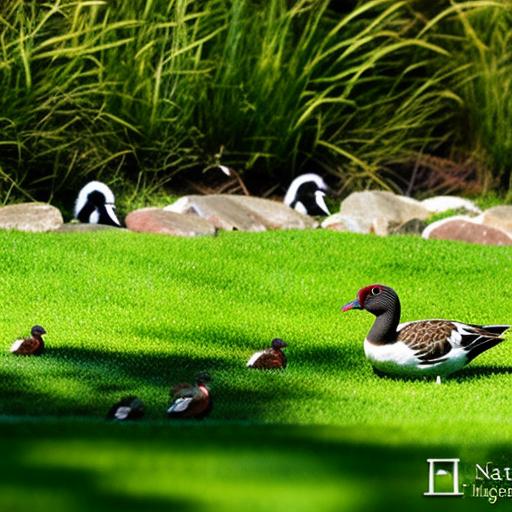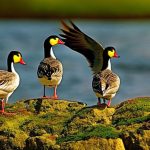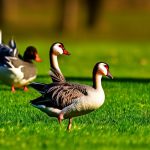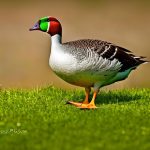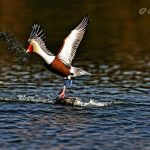Geese are social birds that often travel in flocks and are known for their honking calls and V-shaped flight formations. They are also known for their territorial behavior, especially during nesting season. Geese are herbivores and are attracted to areas with abundant grass and water sources. They are also known to be protective of their young and can become aggressive if they feel threatened. Understanding these behaviors is crucial in finding effective ways to deter geese from your property.
Geese are also known for their strong homing instincts, which means that once they have established a nesting site, they are likely to return to the same location year after year. This can make geese particularly persistent when it comes to staying in an area, especially if they have found it to be a suitable habitat for nesting and raising their young. By understanding these behaviors, property owners can better anticipate and address potential issues with geese on their property.
Key Takeaways
- Geese are social birds that prefer open areas near water and can become aggressive during nesting season.
- Natural deterrents for geese include planting tall grasses, using predator decoys, and allowing natural predators like foxes and coyotes to roam the area.
- Physical barriers such as fences, hedges, and shrubs can prevent geese from accessing certain areas.
- Noise and visual deterrents like scarecrows, reflective tape, and ultrasonic devices can help keep geese away.
- Keeping your yard clean and free of food sources like grass clippings and birdseed can make it less attractive to geese.
- Repellents like taste aversions and chemical deterrents can be used to discourage geese from frequenting certain areas.
- If geese issues persist, seeking professional help from wildlife management experts or pest control services may be necessary.
Natural Deterrents for Geese
One natural deterrent for geese is the use of dogs. Geese are naturally wary of predators, and the presence of a dog can help deter them from settling in an area. However, it’s important to note that not all dogs are effective at deterring geese, and some breeds may be more successful than others. Additionally, it’s important to train the dog to behave appropriately around the geese and not to harm them.
Another natural deterrent for geese is the use of landscaping techniques that make the area less attractive to them. This can include planting tall grasses or shrubs that make it difficult for geese to access open areas, as well as using natural barriers such as rocks or fences to discourage them from settling in a particular location. By making the area less hospitable to geese, property owners can reduce the likelihood of geese nesting on their property.
Physical Barriers for Geese
Physical barriers can be an effective way to deter geese from settling in a particular area. One common physical barrier is the use of fencing or netting to prevent geese from accessing certain areas. This can be particularly effective around bodies of water or other areas where geese are likely to gather. Additionally, installing barriers such as hedges or other landscaping features can help discourage geese from settling in an area.
Another physical barrier that can be effective is the use of floating barriers on bodies of water. These barriers can prevent geese from accessing the water, which can make an area less attractive to them. By using physical barriers, property owners can create a more inhospitable environment for geese, reducing the likelihood of them settling in a particular location.
Noise and Visual Deterrents for Geese
Noise deterrents can be an effective way to deter geese from settling in a particular area. This can include using devices that emit loud noises or using noisemakers such as whistles or horns to scare off geese. Additionally, using visual deterrents such as decoy predators or reflective objects can help make an area less attractive to geese. By using a combination of noise and visual deterrents, property owners can create an environment that is less appealing to geese.
Another effective visual deterrent for geese is the use of predator decoys. These can include decoy coyotes, foxes, or other animals that are natural predators of geese. By placing these decoys in areas where geese are likely to gather, property owners can create the impression that the area is not safe, which can help deter geese from settling in that location.
Keeping Your Yard Clean and Unattractive to Geese
Keeping your yard clean and unattractive to geese is an important step in deterring them from settling in your property. This can include regularly removing any standing water, as well as cleaning up any spilled birdseed or other food sources that may attract geese. Additionally, keeping grass mowed and removing any tall grasses or shrubs can make an area less attractive to geese.
Another important step in keeping your yard unattractive to geese is to avoid feeding them. Feeding geese can encourage them to settle in a particular area, as they will associate it with a food source. By avoiding feeding geese and removing any potential food sources, property owners can reduce the likelihood of geese settling on their property.
Using Repellents to Keep Geese Away
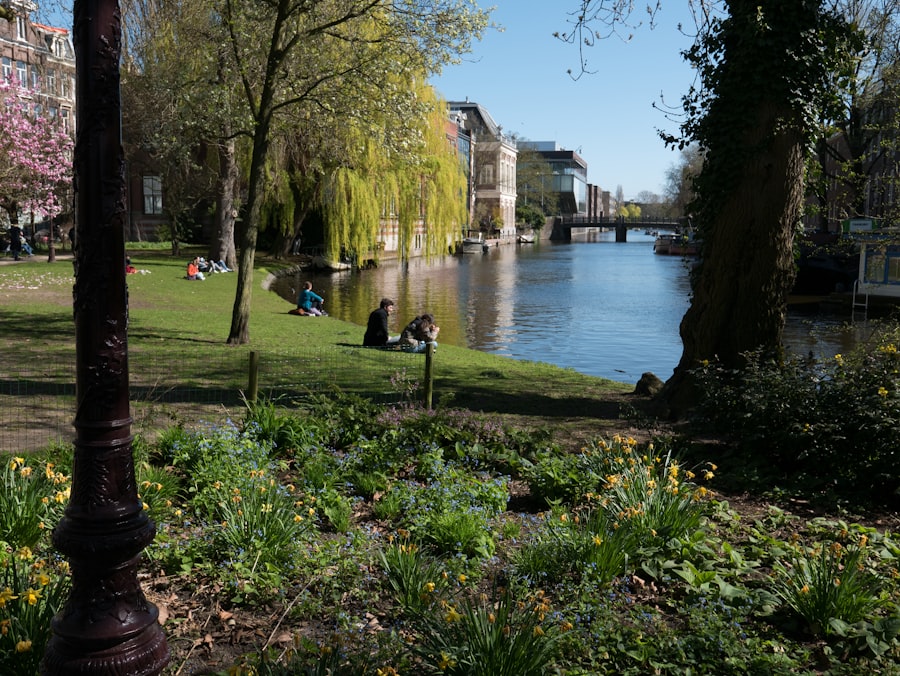
There are a variety of repellents available that can help deter geese from settling in a particular area. These can include chemical repellents that are applied to grass or other surfaces, as well as ultrasonic devices that emit sounds that are unpleasant to geese. Additionally, there are natural repellents such as grape seed extract or methyl anthranilate that can be used to discourage geese from settling in an area.
Another effective repellent for geese is the use of taste aversions. These can include applying bitter-tasting substances to grass or other surfaces that make them unappealing to geese. By using a combination of repellents, property owners can create an environment that is less attractive to geese, reducing the likelihood of them settling in a particular location.
Seeking Professional Help for Persistent Geese Issues
If you have persistent issues with geese on your property, it may be necessary to seek professional help. There are companies that specialize in wildlife management and can provide effective solutions for deterring geese from settling in a particular area. These professionals can assess your property and recommend the most effective strategies for addressing your specific issues with geese.
Another option for seeking professional help is to contact local wildlife authorities or conservation organizations. These organizations may be able to provide guidance on how to effectively deter geese from your property while also ensuring their safety and well-being. By seeking professional help, property owners can find long-term solutions for addressing persistent issues with geese on their property.
In conclusion, understanding geese behavior is crucial in finding effective ways to deter them from your property. Natural deterrents such as dogs and landscaping techniques can make an area less attractive to geese, while physical barriers such as fencing and floating barriers can prevent them from accessing certain areas. Noise and visual deterrents such as predator decoys and noisemakers can also help make an area less appealing to geese. Keeping your yard clean and unattractive to geese by removing food sources and avoiding feeding them is important in deterring them from settling on your property. Using repellents such as chemical sprays and taste aversions can also help discourage geese from settling in a particular area. If you have persistent issues with geese, seeking professional help from wildlife management companies or local authorities may be necessary to find long-term solutions for addressing the issue.
If you’re looking for ways to keep geese off your yard, you may also be interested in learning about the behavior of quails when it comes to sitting on their eggs. Check out this informative article on PoultryWizard to discover more about the fascinating world of quail breeding and egg incubation.
Meet Walter, the feathered-friend fanatic of Florida! Nestled in the sunshine state, Walter struts through life with his feathered companions, clucking his way to happiness. With a coop that’s fancier than a five-star hotel, he’s the Don Juan of the chicken world. When he’s not teaching his hens to do the cha-cha, you’ll find him in a heated debate with his prized rooster, Sir Clucks-a-Lot. Walter’s poultry passion is no yolk; he’s the sunny-side-up guy you never knew you needed in your flock of friends!

